Solo Founder vs Founding Team - Which is better to start with?
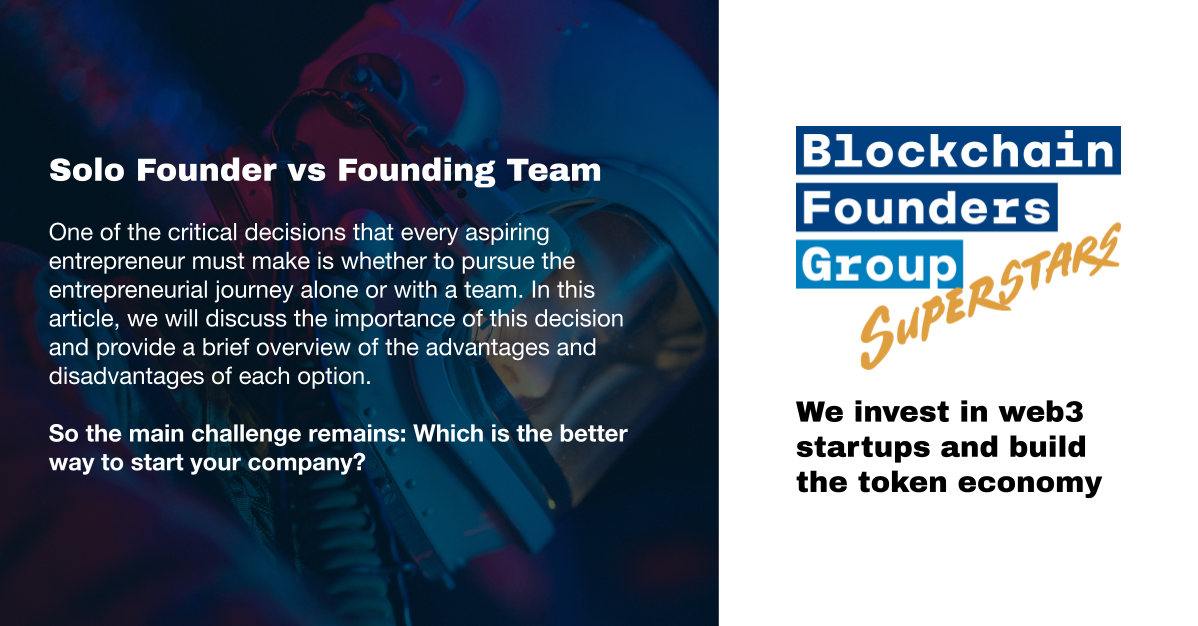
One of the critical decisions that every aspiring entrepreneur must make is whether to pursue the entrepreneurial journey alone or with a team. Choosing between a solo founder and a founding team can have significant implications for the success of the business. In this article, we will discuss the importance of this decision and provide a brief overview of the advantages and disadvantages of each option. - Author: Jona Hauch
Do you need to have co-founders to succeed?
While a solo founder has complete control over the business's vision and decision-making process, they may have limited skills and resources. In contrast, a founding team brings together individuals with diverse skills and expertise, enabling the business to tackle a wide range of challenges and opportunities. However, a founding team may face conflicts, and decision-making may be slower due to the need for consensus and agreement among members.
According to Harvard Business School Professor Noam Wasserman, 65% of startups fail because of conflict among co-founders. A solopreneur ensures that there is zero chance of this risk.
Research findings
While there are numerous examples of co-founding teams achieving success in their ventures, a research by Jason Greenberg and Ethan Mollick, called "Sole Survivors: Solo Ventures Versus Founding Teams", suggested that businesses should look to individual entrepreneurs like Jeff Bezos of Amazon, Sara Blakely of Spanx, and Oprah Winfrey, who started their ventures as solo founders.
The research is based on a survey of creators for thousands of Kickstarter projects conducted between 2009 and May 2015. The study found that companies founded by a single entrepreneur tend to have a longer lifespan compared to those started by teams. Despite the advantages of having multiple individuals with diverse resources and expertise, Greenberg explains that social friction and conflicts that can arise within a founding team may hinder productivity and negatively impact outcomes. Although theoretically, two heads are better than one, research shows that the presence of more than one person at early-stage organizations can lead to a distraction from productive activities toward conflict resolution, which in turn has negative consequences.
The study is based on a survey of creators of thousands of Kickstarter projects between 2009 and May 2015. About 28 percent of the sample was made up of solo founders, 31 percent were two-person teams, and 41 percent were comprised of three or more members.
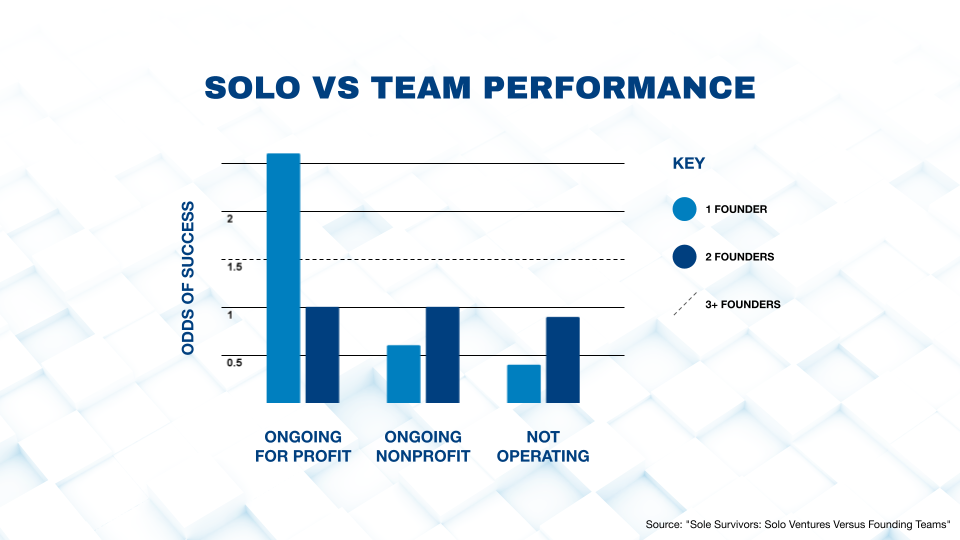
Figure 1: The odds of success for solo founder vs founding team for for-profit and nonprofit organizations.
According to the study, solo founders are 2.6 times more likely to have success with a for-profit venture than three or more co-founders. Solo founders are also less likely to dissolve or suspend their business, with a 54% and 41% lower likelihood compared to three-person and two-person teams respectively. However, when it comes to non-profit organizations solo founders are 42% less likely to succeed than three-person teams, but have similar odds compared to two-person teams.
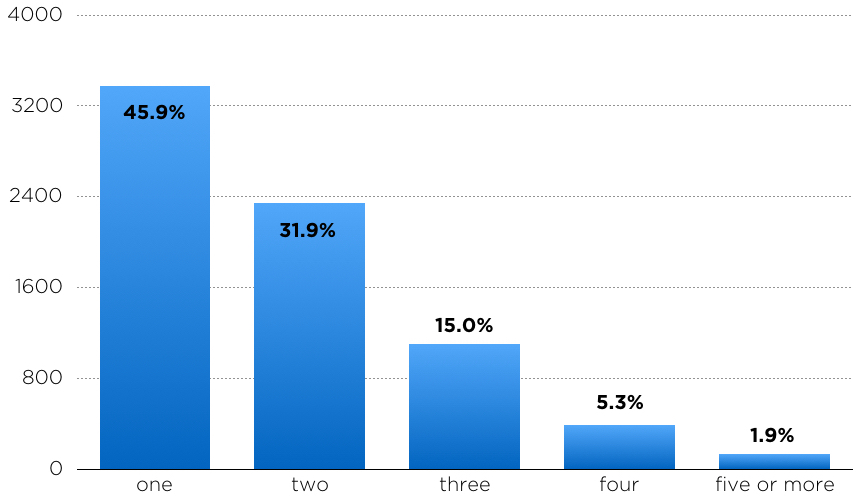
Figure 2: A graphic shared by TechCrunch that shows startups that have raised more than $10 million from investors, broken down by the number of founders.
This graph shows the number of startups that have raised more than $10 million from investors, broken down by the number of founders associated with the company. n=7,348
It turns out that almost half of the companies successful in raising funding did so with a solo founder. Just under one-third of the companies had two founders and only 22 percent of companies had three or more founders. The average number of founders is 1.85 per startup.
Challenges to consider
Of course, being a solo founder also has its challenges. One of the biggest challenges is that it can be difficult to balance all of the responsibilities that come with starting and running a business. Solo founders need to be able to manage everything from product development to marketing to finance, which can be overwhelming at times. They also need to be able to stay motivated and focused by their own during all the ups and downs of entrepreneurship.
Despite these challenges, solo founders can succeed if they are willing to put in the work and make the necessary sacrifices. According to a Forbes article, successful solo founders tend to have certain characteristics in common, such as a strong sense of purpose, a willingness to take risks, and a dedication to continuous learning and self-improvement.
Why can it still make sense to start a business with co-founders?
While there are studies that show the advantages of starting a business without co-founders, there are still enough examples that a venture with co-founders can be successful, too. So in the end, it's a personal decision that you should weigh carefully. Here are some of the benefits of building with co-founders:
- Complementary skills and knowledge: Starting a business is a complex and multifaceted task that requires a diverse set of skills and knowledge. A co-founder with complementary skills can fill in the gaps and help ensure the success of the venture. For example, if one co-founder is a tech expert and the other is a marketing specialist, they can work together to build and promote the product.
- Shared responsibility: Starting a business can be a stressful and overwhelming experience. With co-founders, the burden of responsibility is shared, which can make it easier to manage the challenges that come with starting a business. Co-founders can also hold each other accountable and provide emotional support during tough times.
- More ideas and perspectives: When starting a business with co-founders, there are more people to contribute ideas and perspectives. This can lead to more creative solutions and a better understanding of the market and customer needs.
- Access to networks and resources: Co-founders often bring with them their own networks and resources, which can be invaluable in the early stages of a business. This can include access to investors, suppliers, and potential customers.
- Reduced risk: Starting a business is inherently risky, and having co-founders can help mitigate some of that risk. With multiple co-founders, there is less pressure on any one individual to make the business succeed.
Wondering how to find a co-founder? Check out our article “How to find your ideal co-founder for your Web3 startup".
What kind of a person could be rather a solo founder?
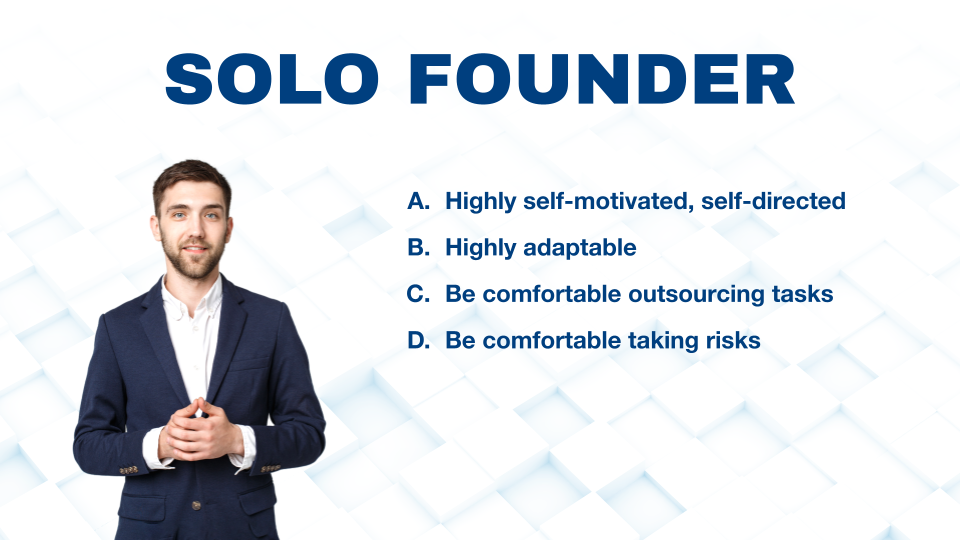
First and foremost, a solo founder needs to be someone who is highly self-motivated and self-directed. Without the support and encouragement of a team, a solo founder must be able to set goals, manage their time effectively, and stay focused on the big picture. They should be comfortable working independently and making decisions on their own, without relying on input from others.
Another important trait of a successful solo founder is a strong sense of vision and purpose. When starting a business alone, it's crucial to have a clear understanding of what you're trying to achieve and why. This helps keep you focused on your goals, make strategic decisions, and maintain the motivation and drive to keep going when things get tough.
In addition, a successful solo founder should be highly adaptable and able to work effectively in a range of different environments. When starting a business on your own, you may need to wear many different hats, from marketing and sales to finance and operations. You'll also need to be able to pivot quickly if your initial strategy isn't working and be willing to experiment and try new approaches until you find what works.
Of course, being a solo founder doesn't mean you have to do everything on your own. A successful solo founder should be comfortable outsourcing tasks and seeking out support from a range of sources, whether that means hiring contractors or freelancers, seeking mentorship from experienced entrepreneurs, or joining networking groups to connect with other business owners.
Starting a business on your own can be a scary prospect and there's always a risk of failure. So a successful solo founder should be comfortable with taking risks and making bold decisions. If you're willing to take calculated risks and make decisions based on your own instincts and experience, you may be able to achieve greater success and independence as a solo founder.
What kind of person should rather start a business with co-founders?
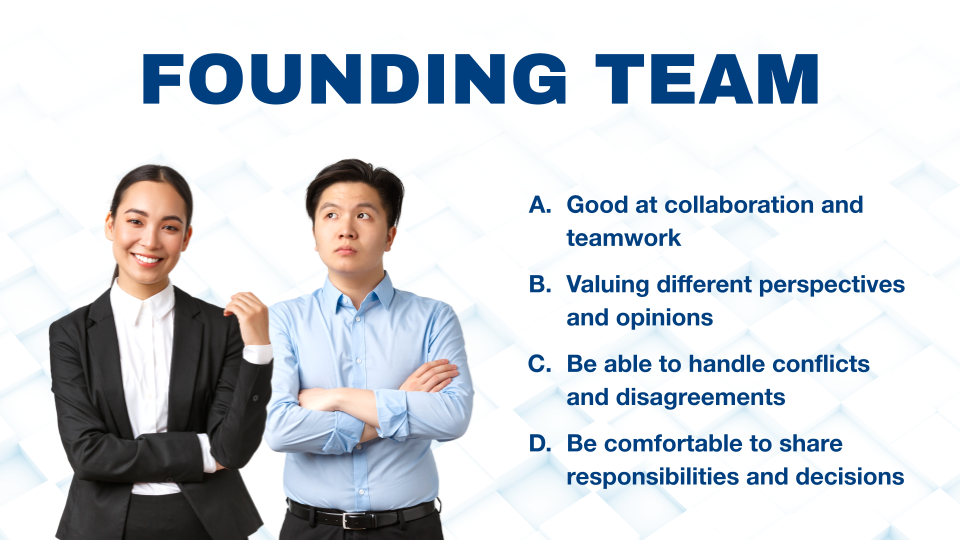
A person who is good at collaboration and teamwork is more likely to benefit from having co-founders. Starting a business requires a range of skills, from marketing and sales to finance and operations, and it's unlikely that any single person will possess all of these skills. Working with co-founders who bring complementary skills and expertise to the table can help ensure that the business has all the necessary bases covered and is set up for success.
If you are a person who values different perspectives and opinions you should also consider working with co-founders as you can highly benefit from this. Working with co-founders who have different backgrounds and experiences can help ensure that the business is considering all the necessary factors and is making the best decisions possible.
Another trait of a person who is better suited to start a business with co-founders is the ability to handle conflicts and disagreements. When starting a business with co-founders, it's inevitable that conflicts and disagreements will arise, and it's important to be able to handle these situations in a constructive and productive way. Co-founders who are able to listen to each other, compromise, and work together to find solutions can help ensure that the business stays on track and doesn't become derailed by internal conflicts.
If you want to work with co-founders, you should also be a person who likes to share responsibilities and decisions. When starting a business with co-founders, responsibility and decision-making are shared, which can help lighten the load and ensure that no single person is shouldering too much of the burden. This can be beneficial for those who may feel overwhelmed or overburdened when starting a business alone.
Learn more about what type of an entrepreneur you are and which types fit best together in our article “The 5 different types of entrepreneurs".
Starting a business can be a lonely and isolating experience, and having co-founders can provide built-in support, accountability, and motivation. Co-founders can help ensure that everyone stays on track and is working towards the same goals, which can help increase the chances of success.
Conclusion
In conclusion, the decision to become a solo founder or part of a founding team is critical for every entrepreneur. While there are advantages and disadvantages to both options, it ultimately comes down to personal preference and the specific needs of the business. Some successful companies have been started by solo founders, while others have thrived with the support of a founding team. However, it is important to weigh the potential benefits and risks of each option carefully before making a decision.
A solo founder should be self-motivated, have a clear vision, and be adaptable, while a founding team should have complementary skills and knowledge, shared responsibility, more ideas, access to networks and resources, and reduced risk. Whatever the choice may be, it is essential to focus on the long-term goals of the business and stay disciplined in achieving success.

About Blockchain Founders Group
Blockchain Founders Group (BFG) is the driving force behind web3 innovation. As a company builder, we bring together a team of blockchain visionaries, experienced entrepreneurs, and industry experts, all committed to nurturing emerging talent. Our BFG acceleration programs serve as your springboard for launching blockchain startups, transforming concepts into reality in just 2-3 months. Each cohort develops 5-8 unique web3 ideas, and selected projects will be financially supported with 70,000 - 100,000 EUR, along with access to our extensive network. Join us in shaping the future of web3!
Stay updated by connecting with us on LinkedIn, Medium, Twitter, and YouTube.
Contact: Max Zheng, Director of Investments, max.zheng@blockchain-founders.io
Subscribe by email
Share this
You May Also Like
These Related Stories
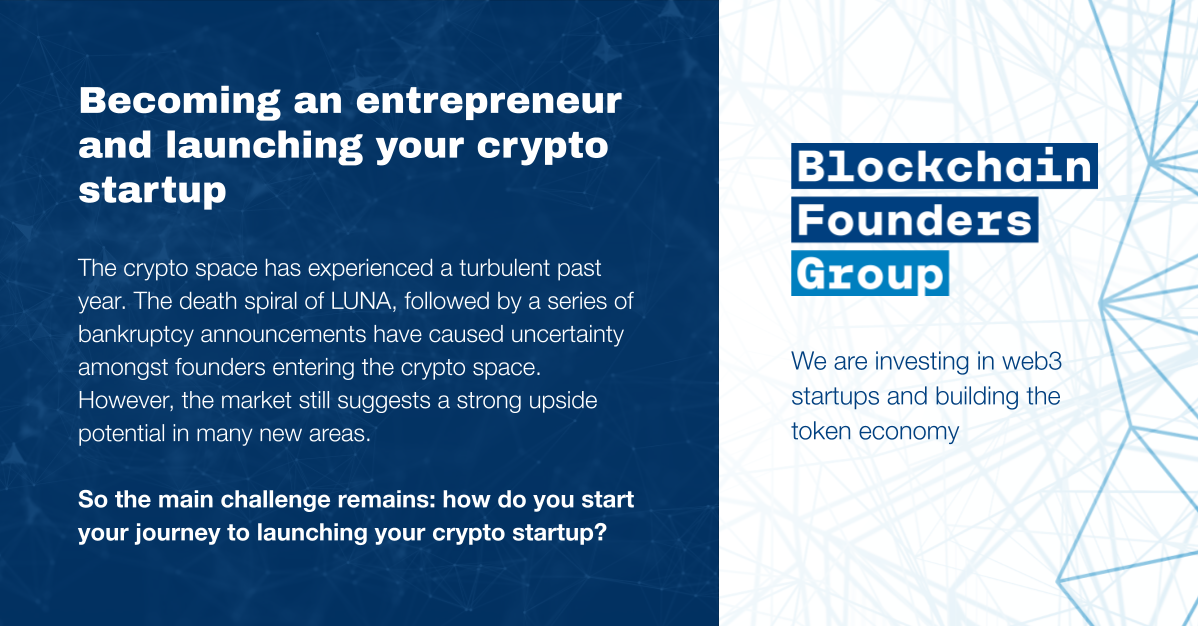
Becoming an entrepreneur and launching your crypto startup
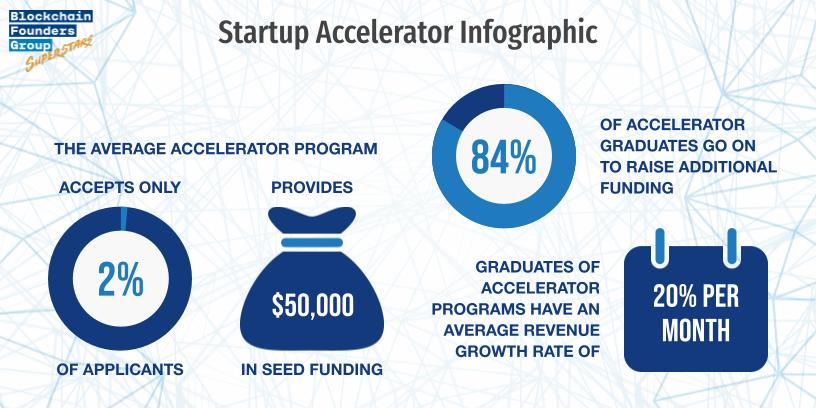
Startup Accelerator Program - Everything You Need to Know


No Comments Yet
Let us know what you think